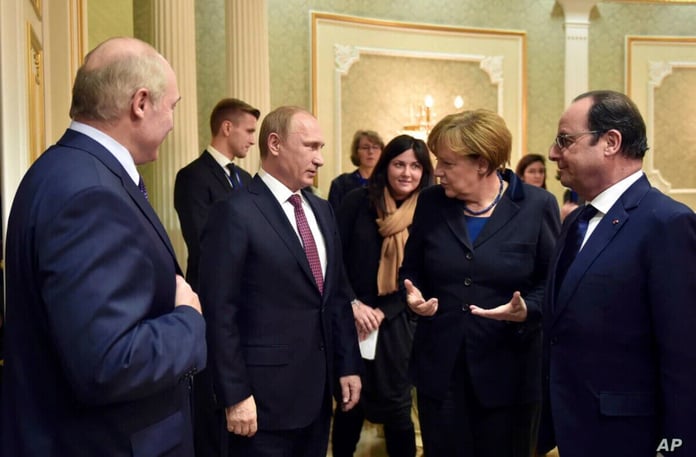
At the inauguration ceremony, Belarusian dictator Alexander Lukashenko took the oath of the “president” of Belarus, to which he declared himself with the help of the Central Election Commission controlled by the Central Election Commission.
The date of the event was kept secret until the last moment.
Putting his right hand on the Constitution, Lukashenko took the “oath ” in Belarusian.
Then he signed the act of taking the oath, after which the head of the CEC Lidia Yermoshina handed him the certificate of the “President of the Republic of Belarus”.
Pavel Latushko , a member of the Coordination Council, said that Lukashenko is only the “president” of the OMON and a handful of officials.
“Where are the jubilant citizens? Where are the diplomatic corps? To be honest, it looks more like a thieves’ meeting for the coronation of another thief in law. It is obvious that Alexander Lukashenko is exclusively president of the OMON and a handful of lying officials,” he said against the background of the secret ceremony of the “inauguration” of the dictator.
Lukashenko, in his first statement after the “oath”, told the officials present in the hall that “this is the day of our victory with you.”
“The day of the inauguration of the President is the day of our victory, convincing and fateful. We did not just elect the president of the country – we defended our values, our peaceful life, sovereignty, and independence. And in this regard, we still have a lot to do,” Lukashenko is quoted by the BelTA state agency controlled by him.
On August 9, presidential elections were held in Belarus. Alexander Lukashenko, who has ruled the country since 1994, took part in them for the sixth time. According to official data from the CEC, he received 80%, and Svetlana Kuznetsova – 10% of the vote.
The riot police used water cannons, stun grenades, and rubber bullets against the protesters. Thousands of people were detained and beaten by security forces, at least five protesters were killed. Dozens disappeared without a trace.
The European Union, the US, NATO, and the Council of Europe stated that the elections in Belarus were neither transparent nor democratic, and called on the official Minsk to respect the rights and freedoms of citizens.
As a result, the Ministry of Foreign Affairs of Latvia included 30 citizens of Belarus, including Alexander Lukashenko, in the list of sanctions and declared persona non grata . Estonia and Lithuania also banned Lukashenko and 29 other officials from entering.
Deputy Chairman of the Belarusian Foreign Ministry Alexander Glaz did not speak too diplomatically about the actions of the governments of the Baltic states, which do not recognize Lukashenko as a legitimate president because of election fraud.
At the same time, according to media reports, the European Union will not impose sanctions against Lukashenko, since Germany is opposed to this with the support of France and Italy .
Lukashenka himself declared that he would not surrender power, because “power is not given to be taken, thrown and given away”.
Russia, at the request of Alexander Lukashenko, created a reserve of law enforcement officers, but Putin promised not to use the Russian security forces until “the situation gets out of control.”
The reason for the introduction of troops may be a statement by Russian Foreign Minister Sergei Lavrov about 200 Ukrainian “extremists” in Belarus , said Ukrainian Foreign Minister Dmytro Kuleba.












